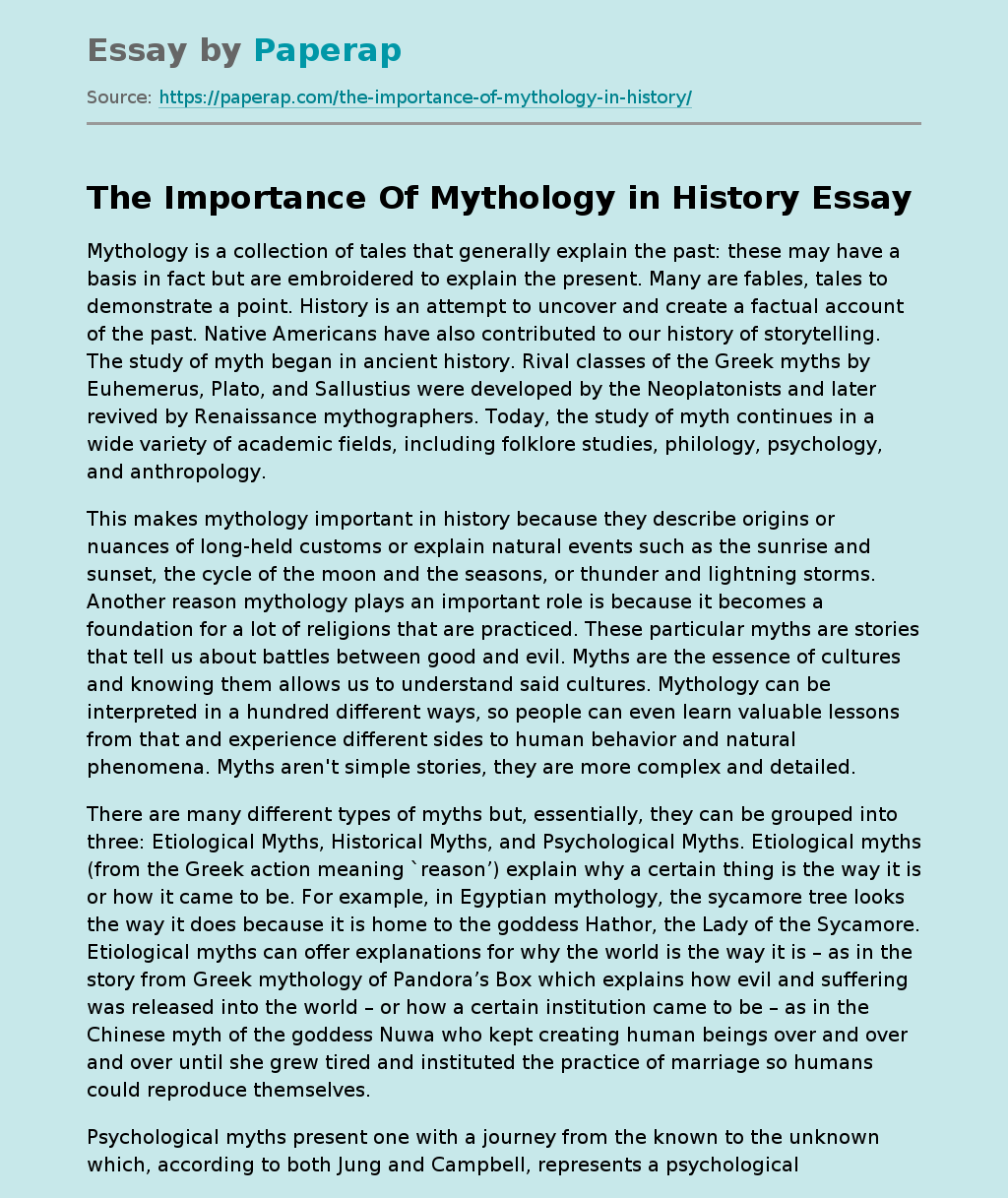Mythology is a collection of tales that generally explain the past: these may have a basis in fact but are embroidered to explain the present. Many are fables, tales to demonstrate a point. History is an attempt to uncover and create a factual account of the past. Native Americans have also contributed to our history of storytelling. The study of myth began in ancient history. Rival classes of the Greek myths by Euhemerus, Plato, and Sallustius were developed by the Neoplatonists and later revived by Renaissance mythographers.
Today, the study of myth continues in a wide variety of academic fields, including folklore studies, philology, psychology, and anthropology.
This makes mythology important in history because they describe origins or nuances of long-held customs or explain natural events such as the sunrise and sunset, the cycle of the moon and the seasons, or thunder and lightning storms. Another reason mythology plays an important role is because it becomes a foundation for a lot of religions that are practiced.
These particular myths are stories that tell us about battles between good and evil. Myths are the essence of cultures and knowing them allows us to understand said cultures. Mythology can be interpreted in a hundred different ways, so people can even learn valuable lessons from that and experience different sides to human behavior and natural phenomena. Myths aren’t simple stories, they are more complex and detailed.
There are many different types of myths but, essentially, they can be grouped into three: Etiological Myths, Historical Myths, and Psychological Myths.
Etiological myths (from the Greek action meaning `reason’) explain why a certain thing is the way it is or how it came to be. For example, in Egyptian mythology, the sycamore tree looks the way it does because it is home to the goddess Hathor, the Lady of the Sycamore. Etiological myths can offer explanations for why the world is the way it is – as in the story from Greek mythology of Pandora’s Box which explains how evil and suffering was released into the world – or how a certain institution came to be – as in the Chinese myth of the goddess Nuwa who kept creating human beings over and over and over until she grew tired and instituted the practice of marriage so humans could reproduce themselves.
Psychological myths present one with a journey from the known to the unknown which, according to both Jung and Campbell, represents a psychological need to balance the external world with one’s internal consciousness of it. However that may be, the story of the myth itself usually involves a hero or heroine on a journey in which they discover their true identity or fate and, in so doing, resolve a crisis while also providing an audience with some important cultural value. Historical myths retell an event from the past but elevate it with greater meaning than the actual event (if it even happened). One example of this is the story of the Battle of Kurukshetra as described in the Indian epic Mahabharata in which the Pandava brothers symbolize different values and provide role models, even if they are occasionally flawed.
Kurukshetra is then presented in microcosm in the Bhagavad Gita where one of the Pandavas, Arjuna, is visited on the battlefield by the god Krishna, an avatar of Vishnu, to explain one’s purpose in life. Whether the Battle of Kurukshetra ever took place is immaterial to the power of these two stories on a mythological level. The same can be said for the Siege of Troy and its fall as described in Homer’s Iliad or Odysseus’ journey home in the Odyssey or Aeneas’ adventures in the work of Virgil. In conclusion, mythology is important in history because of the way it explains the past and builds foundations that are still used to this day. Have you ever read about mythology?
The Importance Of Mythology in History. (2021, Dec 14). Retrieved from https://paperap.com/the-importance-of-mythology-in-history/

